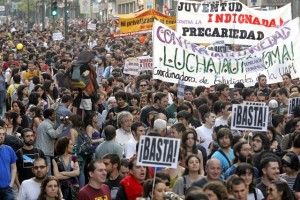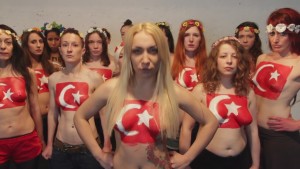by Maro Youssef
On October 30th, 2015, the Power, History and Society (PHS) working group hosted Professor Bruno Frère for a lecture on resistance to domination, French pragmatism, and phenomenology. Frère’s work is concerned with finding adequate ways of making sense of new forms of resistance to domination, such as those embodied by the anti-austerity indignados, the hacktivist group Anonymous, the international women’s movement, Femen, or the practitioners of “solidarity economy.” As a French social theorist, Frère is particularly interested in the ability of certain theoretical currents to account for these forms of contestation and their potential for emancipation from alienating forces.

Frère proposes that we utilize French pragmatist sociology in addition to, or in place of, Bourdieusian critical sociology. Frère suggests that Bourdieu’s work rests on the assumption that capitalism and modernity have robbed social actors of their original purity and of the consciousness of their dominated condition. Bourdieu argues that social actors are not equipped to identify and critique their alienation, positioning sociology as the discipline that will save social actors from the alienation of their habitus.
Frère claims that French pragmatism’s phenomenological foundation provides a superior comprehensive model to understand social action and its justification. He suggests that the pragmatist notion of grammar is useful to express the normative macro-elements that motivate local actions and their justifications; phenomenology helps us understand those actions and justifications as fundamental ways of relating to the world that can contradict the lived situation.

Frère points to four main categories of moral values that solidarity economy (SE) actors deploy: conviviality, self-management, creativity and political activism. Frère calls these values and the discourse around them the “grammar” of the movement. Solidarity economy activists use this grammar to set themselves apart from other groups including leftists, trade unions, or political parties. They avoid terms like “structures of representation,” “hierarchy,” “vertical federations” and “verbal claims” to emphasize their apolitical, non-hierarchical nature.
Solidarity Economy groups often commit “grammatical mistakes” that could threaten their legitimacy. For example, Le Movement Pour L’Economie Solidaire and Les Pénelopes are the two main SE groups in France. They compete for national and international recognition and often make these mistakes during public disputes that highlight their desire to monopolize power and represent the movement as a whole. They quickly recover from public mistakes and revert back to their discourse where they use terms such as “horizontal development,” “anti-authoritarianism,” “political economic practices,” and “direct democracy.”

Frère suggests Le Movement Pour L’Economie Solidaire and Les Pénelopes focus on the “self management” aspect of the moral values discussed above in order to avoid grammatical mistakes and remain “authentic.” They may use politics as a solution to correct their grammatical mistakes. Perhaps there could be a rotation within group leadership or perhaps they need to consider the possibility of completely removing representation and having an egalitarian, leaderless movement instead.
Frère’s use of French pragmatist theories that focus on the every day life of the individual and his decision to refrain from using Foucauldian or Bourdiesian theories in his research is unexpected but welcomed. His rejection of Bourdieusian theories of domination gives the actors in social solidarity movements and solidarity economy groups more agency and credit for reflexivity since they are aware of their location in the structure. Frère does not completely dismiss traditional contemporary French theorists work. Instead, he urges scholars to continue to use Pierre Bourdieu’s work to understand managerial domination.
Maro Youssef is a second year Ph.D. student in the Sociology at the University of Texas at Austin. Her research interests include gender, political sociology, culture, social movements, and North Africa and the Middle East.
